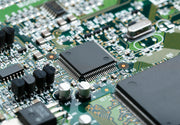
In the realm of industrial automation, where precision and efficiency are dominant every component plays a crucial role in ensuring seamless operations. Among these components, Input /Output (I/O) modules stand out as the backbone of automation systems. They serve as the interface between the field devices and the control system, facilitating the exchange of data that drives the entire process. In this blog, we look into the world of I/O modules, exploring their significance, functionality, and how they can be optimized to maximize performance in industrial automation settings.
What Are I/O Modules?

Input /Output (I/O) modules are devices designed to interface with various sensors, actuators, and other field devices in an industrial environment. They act as communication channels between these devices and the central control system, enabling the exchange of signals, data, and commands.
Significance of I/O Modules in Industrial Automation
I/O modules play a crucial role in industrial automation systems for several reasons:
Data Acquisition: I/O modules collect data from sensors and other devices in the field, providing vital information about processes, equipment status, and environmental conditions.
Control and Monitoring: By transmitting control signals to actuators and monitoring feedback from sensors, I/O modules enable precise control of industrial processes, ensuring optimal performance and safety.
Flexibility and Scalability: Modern I/O modules offer flexibility and scalability, allowing for easy integration into existing automation systems and accommodating future expansion and upgrades.
Reliability: Robust construction and advanced diagnostics features make I/O modules highly reliable, minimizing downtime and ensuring continuous operation in demanding industrial environments.
Optimizing Performance with I/O Modules

To maximize efficiency and performance in industrial automation, it's essential to optimize the utilization of I/O modules. Here are some strategies to achieve this:
Selecting the Right Type of I/O Modules: Different applications require different types of I/O modules, such as digital inputs/outputs, analog inputs/outputs, specialty modules for specific functions, and communication modules for network connectivity. Choosing the appropriate type based on the application's requirements is crucial for optimal performance.
Efficient Wiring and Installation: Proper wiring and installation of I/O modules are essential to minimize signal interference, ensure reliable communication, and simplify maintenance. Follow manufacturer guidelines and industry best practices for wiring and mounting I/O modules in the field.
Optimizing I/O Configuration: Configure I/O modules according to the specific needs of the application, including setting input/output parameters, scaling analog signals, and configuring diagnostic features. Fine-tuning these settings can improve accuracy, responsiveness, and overall system performance.
Implementing Redundancy and Fault Tolerance: To enhance reliability and fault tolerance, consider implementing redundant I/O modules and communication paths. Redundancy ensures continuity of operation in case of module failure or communication errors, minimizing downtime and production losses.
Monitoring and Maintenance: Regular monitoring and preventive maintenance of I/O modules are essential to identify potential issues early, prevent failures, and optimize performance. Utilize built-in diagnostic features, perform periodic inspections, and replace faulty modules promptly to ensure uninterrupted operation.
Conclusion
In conclusion, I/O modules are essential components of industrial automation systems, enabling precise control, data acquisition, and communication in a wide range of applications. By understanding their significance and implementing optimization strategies, businesses can maximize efficiency, reliability, and performance in industrial automation operations. Whether in automotive manufacturing, food processing, or any other industry, optimized I/O modules cover the way for enhanced productivity, quality, and competitiveness in today's dynamic market landscape.









